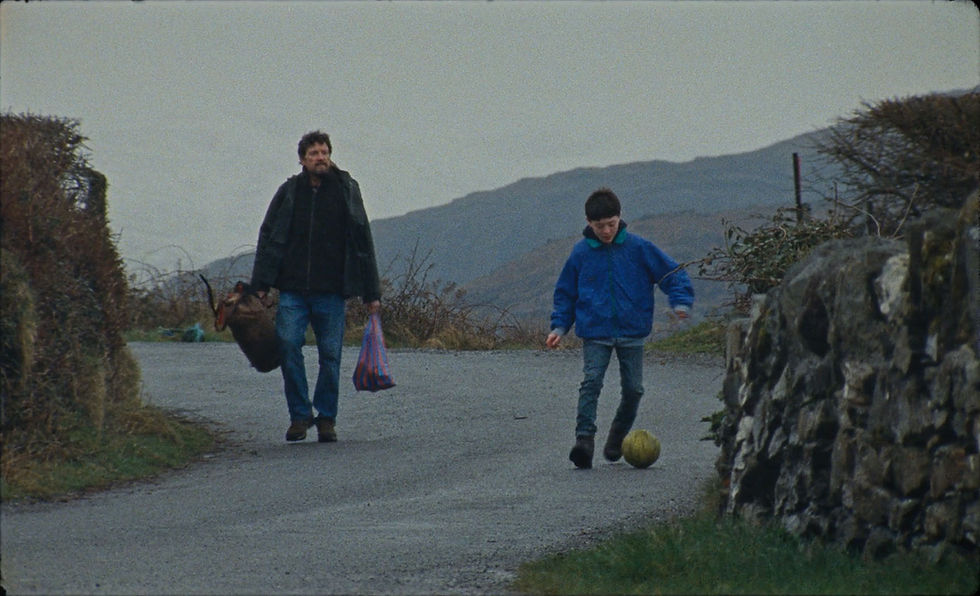Two for the Road (2023)
- Kyle Bain
- Nov 15, 2023
- 3 min read
Two for the Road is a simple telling of the weekend escapades of a father, Hugh (Steve Wall), and son, Oscar (Ewan Morris). However, this typical weekend of visitation quickly turns into something less than ideal for Oscar as he’s forced to deal with the ups and downs of his relationship with his challenging father. From camping trips to bar benders, Oscar is about to experience it all.
I’m not sure that viewers are ever given the opportunity to be happy when watching Two for the Road. In the moments when there is something akin to happiness present, those moments are quickly stolen from us–intentionally. I really appreciate this aspect of Two for the Road, because it feels honest–not like this is some story manipulated for cinema. Oscar is the centerpiece of the film, and everything effectively revolves around him. The relationship between him and his father isn’t ideal, but there are moments in which Oscar finds the strength to smile. We get to see and hear everything that Oscar experiences, and we are allowed access to his life so that we, too, can experience this long weekend with Hugh.
We are transported back to the 1990’s in Two for the Road, and the aesthetic really helps to make that time period apparent. A slightly simple and bleak set design, hair and makeup, and the thing that best helps with this aspect of the film, the grittiness and the rugged look of the frame around the screen. The entire film is framed by black, but the frame isn’t sharp, it’s jagged and it sometimes draws the attention of viewers. While it does seem a tad odd that framing the film steals the attention away every now and again, it still works to remind viewers of the grittiness of the film as a whole. Two for the Road does a beautiful job of transporting us to a different time, and constantly reminding us of where and when we are.
I’d be remiss if I didn’t mention the acting of Morris. He’s young and likely relatively inexperienced in cinema–but he finds ways to command the screen–even in the most challenging screens. With so much going on during some of the scenes Two for the Road runs the risk of characters blending too much into the background and being incapable of standing out. As a result of how powerful Morris’ performance is, however, he constantly finds ways to stand out and to make it clear that he’s the center of this film. I’m truly impressed by what Morris is able to accomplish throughout the course of Two for the Road, and he’s maybe the most important part of the entire film.
Writer-Director Lochlainn McKenna makes the unique decision to have some scenes be almost completely pitch black. In these moments it’s almost impossible to see the things taking place on screen, and yet, it’s made relatively clear the purpose of these moments in Two for the Road. It’s in these darker moments that Oscar is consumed by that darkness much like he is consumed by the decisions of his father. This metaphor helps to effectively make clear the way in which Oscar feels throughout the film–and in those powerful moments we feel for him the most.
The most important thing in Two for the Road is Oscar, and it’s imperative that McKenna find ways for him to resonate with us throughout. We are quickly pulled back to the late stages of the twentieth century, and from then on out we find new ways to appreciate Oscar. Whether it’s through Morris’ acting, his hair and makeup, or the dark scenes in which he appears to be consumed, Two for the Road becomes a story about this young man, and it’s presented to viewers in a way that will certainly resonate.
Written & Directed by Lochlainn McKenna.
Starring Ewan Morris, Steve Wall, Natalie Britton, Ger O’Leary, Rachel Daly, Sadhbh Daly, etc.
⭐⭐⭐⭐⭐⭐⭐⭐½/10





Hi Kyle thank you so much for your lovely and insightful review of our film, we are glad you connected with it like so many others! Really thankful for your time - Gráinne Dwyer (Producer)